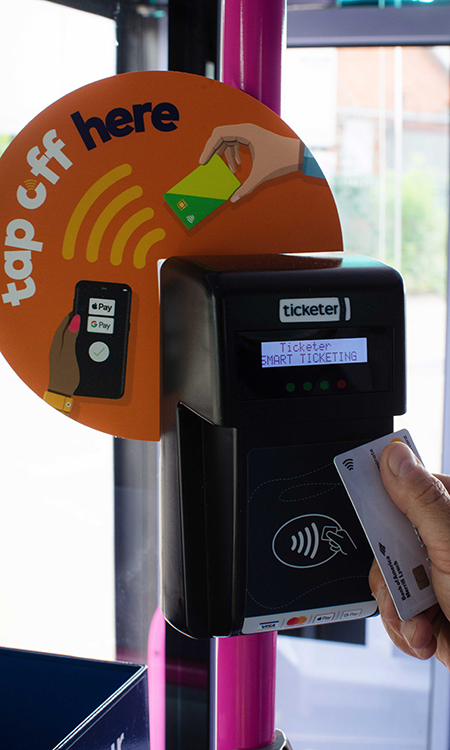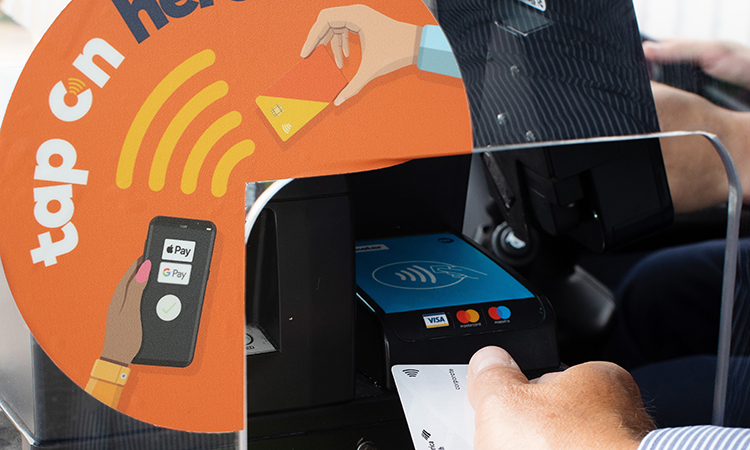Improving customer journeys with better technology
- Like
- Digg
- Del
- Tumblr
- VKontakte
- Buffer
- Love This
- Odnoklassniki
- Meneame
- Blogger
- Amazon
- Yahoo Mail
- Gmail
- AOL
- Newsvine
- HackerNews
- Evernote
- MySpace
- Mail.ru
- Viadeo
- Line
- Comments
- Yummly
- SMS
- Viber
- Telegram
- Subscribe
- Skype
- Facebook Messenger
- Kakao
- LiveJournal
- Yammer
- Edgar
- Fintel
- Mix
- Instapaper
- Copy Link
Posted: 7 February 2022 | Owen Hughes - First Group | No comments yet
Since June 2021, First Bus has implemented one of the largest Tap On/Tap Off (TOTO) schemes outside of London. For Intelligent Transport, Owen Hughes, Head of Retail Development at First Bus, provides an update on the rollout and its impact so far.
Rolling out simplified tickets


Credit: Ticketer
The introduction of Tap On/Tap Off (TOTO) to Leicester and Potteries was a significant commitment for First Bus. We know that, for customers, one of the most important things that they consider when taking public transport is having an easy way to pay for their travel. We also know that it is even better if payment is personalised, so that customers just pay for the service that they use versus a flat fare.
Our own desire to make payment easier for our customers aligns with the UK government’s ambition for bus fares and ticketing to be made simpler, more affordable and more accessible, as outlined in the National Bus Strategy. Our shared vision for bus has allowed us to utilise the Department for Transport’s (DfT) Transforming Cities Fund to invest in technology that meets all of these needs, namely Tap On/Tap Off.
Tap On/Tap Off allows customers to ‘Tap On’ with their contactless card or mobile payment device when they begin their journey, and ‘Tap Off’ at the end, meaning that they are automatically charged for only the stops that they travel. The payment system was introduced to 92 buses in our Leicester fleet and 105 in our Potteries fleet in Summer 2021 – enabling us to simplify the payment of journeys for a huge number of customers. Since introducing Tap On/Tap Off, we have been monitoring its uptake so that we can build on the initial rollout in the best way and inform future rollouts across the country.
Where we are now
Across Leicester and Potteries, around 50,000 individual journeys are currently being made each month via Tap On/Tap Off, and we’ve been seeing constant growth on this figure. We’ve also had a wealth of customers get in touch to let us know that they find the system to be a useful tool and that it’s great to see continued investment in improving vehicles. We were incredibly pleased that the implementation of the system was virtually seamless and helped to enable customers to get back on the bus following the lifting of COVID-19 restrictions.
The shift away from cash payments has accelerated significantly during the pandemic toward a mix of contactless payment and mobile ticketing, and we’ll continue identifying ways to make payments easier for our customers”
While the initial figures are pleasing, there is still plenty of room for growth, and we continue to encourage more customers to adopt the technology. Large-scale behavioural shifts always take time, and this is something that we planned for as we prepared for launch. Though there are some customers who have been early adopters of Tap On/Tap Off, such as those on university routes, others still prefer to buy in advance or with cash. The shift away from cash payments has accelerated significantly during the pandemic toward a mix of contactless payment and mobile ticketing, and we’ll continue identifying ways to make payments easier for our customers.
Encouraging behavioural change
Often, reluctance to try a new system can come from not understanding how it works, or not recognising the personal benefits and rewards that come with it. Other technology rollouts have taught us that new launches are more effective if we ensure that drivers are set up with everything that they need to demonstrate how the new technology improves journeys. Whilst we can publicise and spread the news of the rollout, ultimately, bus drivers are the ones who are face to face with our customers, can answer their questions and can help them to make payments.


Credit: First Bus
Around six to eight weeks prior to the Leicester and Potteries rollout, we created a bespoke ‘Journey Makers’ training module for drivers, so that they could help customers to try Tap On/Tap Off. We ensured that drivers felt comfortable chatting with customers about the new system and that they could explain exactly how it would benefit them. By boosting our drivers’ knowledge and confidence, we empowered them to have conversations with customers about the new system, which is an incredibly effective way of influencing behaviour.
Interested in finding out more about the Leicester and Potteries launch?
Read Owen Hughes’ article, included in Issue 3 2021 of Intelligent Transport, about the original implementation of the Tap On/Tap Off scheme by First Bus Leicester and First Bus Potteries here:
Further implementation
With the rollout in Leicester and Potteries providing encouraging figures and having a clear impact on customer journeys, we examined other potential locations for Tap On/Tap Off rollout. Our analysis helped us to determine the next region – West Yorkshire.
First West Yorkshire is the largest bus operator in the region, with more than 880 buses transporting around 350,000 people every day. Detailed analysis of customer and purchasing data enabled us to look at restructuring fares with ‘pay-for-what-you-use’ pricing to create a fairer system, and Tap On/Tap Off was a natural addition. The technology has now been installed on all buses in the area following an £850,000 investment to further simplify journeys and support transformational change to aid the wider ambitions of the Bus Service Improvement Plan (BSIP).
Alongside the introduction of Tap On/Tap Off, all ticket prices are now consistent across West Yorkshire, creating equality between districts, removing boundaries between towns and cities and enabling travel anywhere in the region with the same ticket”
Alongside the introduction of Tap On/Tap Off, all ticket prices are now consistent across West Yorkshire, creating equality between districts, removing boundaries between towns and cities and enabling travel anywhere in the region with the same ticket. Tap On/Tap Off will also pave the way to an all-operator integrated system in the future.
Among five new ticket types is a discounted Return for customers who make a simple journey to a destination and back, and singles – which account for 60 per cent of all sales – have been simplified to four lower prices. We have also responded to changes in commuting and hybrid working with the creation of Flexi tickets with three-day and five-day options for people to plan their travel Monday-Friday or over a full week, and a 13-day ticket allows trips to be spread over a month.
Looking ahead
Our sustained investment in technology across the UK, and our ongoing collaboration with local authorities to implement new technology has simplified journeys for hundreds of thousands of customers. Not only this, but it has created a better boarding experience for our customers and, importantly, lowered the cost of taking the bus for many people. Improving the bus ticketing proposition is a priority and, as we work to enact Bus Service Improvement Plans (BSIPs) around the country, we will continue exploring opportunities to launch Tap On/Tap off and similar schemes in other areas, so that more customers can experience the best journeys for the best value fare.
Owen Hughes joined FirstGroup in 2010 on the Graduate Training Programme. He undertook various roles within Commercial across First Bus in the North of England, Scotland and then UK-wide, where he focussed on developing the ticketing proposition for customers. In 2018, Hughes took on the role of Head of Retail Development and, since then, he’s led the team responsible for developing the First Bus customer app and defining and delivering the company’s capped fares programme.
Related topics
COVID-19, Passenger Experience, Public Transport, Ticketing & Payments
Related modes
Bus & Coach
Related countries
United Kingdom
Related organisations
First Bus, First Bus Leicester, First Bus Potteries, First West Yorkshire
Related people
Owen Hughes








